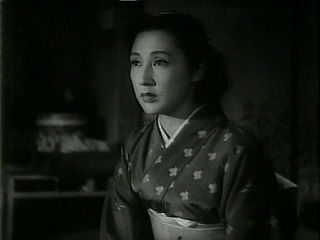Is this what being a woman or a wife is supposed to be?

To go with Ginza Cosmetics, TCM aired Mikio Naruse's 1953 film Wife, the second of three he released that year. With its utilitarian title -- a direct translation from the Japanese -- one might expect it to tell the story of Toichi and Mihoko Nakagawa entirely from her perspective, but Naruse actually opens the film with competing voice-overs from both of them as they bemoan how stagnant their lives have become over their ten-year marriage. Mihoko (Mieko Takamine) is disappointed by her husband's lack of advancement, forcing them to take in boarders and her to take side jobs to make ends meet, while Toichi (Ken Uehara) translates his own disatisfaction into an office romance with typist Sagara (Yatsuko Tan'ami), a single mother who keeps in touch with him when she returns to Osaka to live with her family.
To put the couple's marital woes into perspective, screenwriter Toshirô Ide, working from a novel by Fumiko Hayashi, contrasts the Nakagawas with their boarders the Matsuyamas, who split up when the wife (Chieko Nakakita) and sole breadwinner abruptly leaves her chronically unemployed husband (Hajime Izu), thus leaving him without the means to pay the rent. Art school student Tanimura (Rentarô Mikuni) is in the same financial boat, but the best he can do is moon over Mihoko's sister-in-law Yoshimi (Michiyo Aratama), a young widow who has no interest in remarrying anyone, least of all him. Then there's Mihoko's single friend Setsuko (Sanae Takasugi), who provides her with a place to spend the night when she walks out on her husband and him with a simple piece of advice when she visits him at his office the next day. "Don't be a fool," Setsuko tells Toichi. "Just be a good husband." In light of the film's ambivalent ending, though, it's safe to say he still doesn't know how to do that.